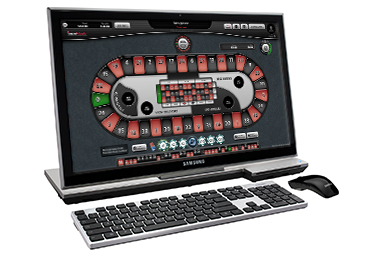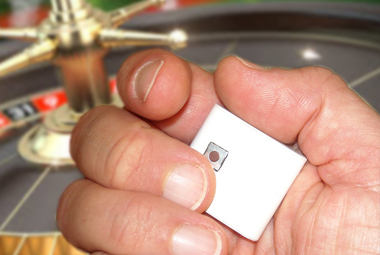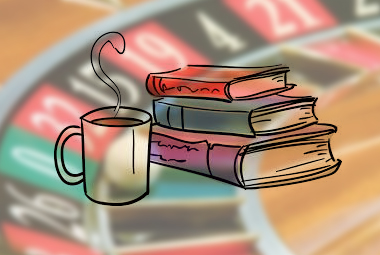Beating the Game of Roulette

The first thing that I am going to do is include a link to my LCB Editorial on this subject in the, ‘Comments,’ after it is published because that is certainly more thorough and comprehensively written and researched. However, the question has recently been posed to me whether Roulette computers and/or manual tactics used to try to copy what the computers do can be used to beat the game of Roulette.
While it may seem highly improbable that Roulette could be beaten even with the aid of a computer device, there have been multiple documented cases of such occurring as far back as the 1970’s. Norman Packer headed a small group known as, ‘The Eudaemons,’ who endeavored to create a computer system that, by tapping their toes when the ball reached a certain point on the wheel three times, would simulate the trajectory and deceleration of the ball faster than it was actually happening and send electronic impulses to a use fitted with a device under the shirt for that purpose that would essentially tell the individual what section of numbers should be bet. In the event that the computer either determined the result to be essentially unpredictable, or the computer could not determine the likely result fast enough, it would send a signal telling the wearer simply not to bet.
Reports vary as to whether the questionable legality of such a device resulted in the group no longer using it, or if it was the fact that the device was largely impractical. Either way, while Packer claims the group made a profit whilst using the computerized device, the group eventually disbanded and use of the device was discontinued.
Three decades later, the use of a more sophisticated device, involving a laser scanner and simulator programmed into a cell phone, surfaced in a number of news stories as reported by multiple news agencies in the United Kingdom. As reported, a trio of three people who took a casino called The Ritz for 1.3 million pounds in the space of just a few days had allegedly been arrested, though several months later, it was reported that they were not charged with anything and were allowed to keep the money.
A few years after that event, an exhaustive study was done to determine whether or not Roulette could be beaten by a computer-aided device. The study looked at two different devices, one similar to that used by Packer in the 1970’s as well as a more sophisticated device that involved the use of a high-speed camera (ninety frames per second) placed directly over the Roulette wheel.

Interestingly enough, though they concluded that Packer’s device was a viable predictive means that could be used to beat Roulette, the sample size they used was nothing short of insignificant on that particular experiment. Once again, they used the same exact means of an individual manually inputting when the ball reached a certain point on the wheel. Simply put, it guessed the correct half of the wheel on thirteen of twenty-two occasions as well as guessing the specific number correctly three times. While such guessing would result in a profit, the probability of just randomly guessing a number on twenty-two occasions and being correct three times is just over two percent. The study also did not list which specific guesses were right, so it is also not inconceivable that the computer guessed correctly on the twenty-second attempt, and the two researchers terminated that study in the interest of arriving at a results-oriented conclusion.
However, the group assembled a camera directly over the Roulette wheel that guessed a specific number in which the ball would land outside of the 99% confidence interval over 700 trials, which is arguably a significant sample size. By itself, I wouldn’t necessarily suggest that is all that impressive because it simply means that the computer guessed right only thirty-one or more times. However, what is much more interesting is that the numbers that appeared before the predicted number were found, with greater than 90% confidence, to be less likely to hit because it would necessitate the ball going backwards.
While some people might conclude that those results are still not statistically meaningful, even taken together, I think that it makes for a compelling argument that the computer at least could be viable.
Visual ballistics sets out to achieve manually what Packer could only do with computer help, and the efficacy of visual ballistics has not been proven to any meaningful degree on an unbiased wheel. Theoretically, the combination of visual ballistics combined with an inherently imbalanced wheel could result in an even greater advantage for a player, but on a balanced wheel, it has not been conclusively demonstrated that visual ballistics alone results in a viable way to beat the game.
For one thing, it is difficult to believe that a human alone, based on his or her perception of the deceleration and trajectory of a Roulette ball, several revolutions and counter-revolutions of the Roulette wheel prior to its stopping point, could mentally determine the likely resting place with any meaningful degree of certainty. Even if that could be done at a long-term advantage, that advantage would likely be so slim that it would take thousands of samples, if not tens of thousands, to conclusively prove that such an advantage existed.

In many jurisdictions in the United States, if not all of them, the use of a computer aid to attempt to beat the game of Roulette is patently illegal. Such devices vary in legality in other countries with them being perfectly legal in Great Britain at one point, then illegal again, and back to legal when the casinos were deregulated and essentially told to police themselves. Of course, much like a player might be trespassed from a given property for other means of advantage play, just because it is legal does not mean that the casino will not take adverse action against you for doing it.
While the computer may have been successful for Packard in the 1970’s, there are a number of devices online that claim to be able to beat the game, and I do not vouch for any of them as I have not, and would not, either purchase or use them. Furthermore, there are certain croupier procedures that exist now that were not as demanded in the 70’s such as a croupier being essentially required to alter his/her delivery of the ball, not just in terms of speed, but with respect to other factors (such as spin) as well.
In conclusion, I believe that there are some computers that could beat the game of Roulette under certain conditions, particularly in the case of a computer that can identify wheel bias or when a croupier has a delivery that is more easily predictable by an advanced system. Furthermore, it is almost certain that a computer with enough information, such as one attached to a camera mounted directly over the Roulette wheel, will have access to enough information to successfully simulate and deliver the likeliest result prior to, ‘No more bets,’ being called. Good luck getting such a device installed in the casino without help from the inside, though, and I believe that sort of collusion would be illegal just about everywhere.
Comments
I experimented with visual ballistics for about one day. I believe it may be possible to do but have not devoted enough time to it to fall behind it unequivocally. For it to work, I believe the only way possible is with E-roulette. I will explain why.
For my brief (one day) experiment with it, I chose a spot on the opposite side focused on the ball track near where it shoots out. The countdown helps gear you to being prepped, something missing from a live dealer. The concentration level for me was too intense, it gave me a splitting headache but perhaps with plenty of practice this can be minimized.
For me, I tried to keep in mind which zero the ball passed first upon being spat out and clocked revolutions past the green. This made it very easy to use peripheral vision to see the green as it passed by each spin. I can't remember now what the parameter was, but I used this to determine which bilateral half of the wheel I would predict the ball to land on, the two halves being either side of the wheel formed by the diameter line of the zero and double zero.
Basically, I was clocking whether I could get and entire side of the wheel.
Here is where the real necessity of doing this with E-roulette comes in. Visual ballistics isn't good enough by itself. You need to also be able to get your actual bets down. There is no even money bet which would be satisfactory as the numbers are organized around the wheel. What I would do is make an initial bet covering every number on one side of the wheel (which side didn't matter and this first wager was a luck wager, it hit or didn't). Once completed, whenever visual ballistics told me the ball was going to land on that side, I simply hit the re-bet button and all my bets were instantly made. If I determined the losing side was where the ball would land, I skipped betting the spin.
I had a small one day success (winning a little over a hundred dollars) and obviously this could be simply luck for the day. But if I was going to ever go back to it, I cannot see any other way for it to be successful (that is the utilization of E-roulette to help with the making of the necessary bets).
I played a Roulette Tournament once as we came to the last spin (1st Prize $30,000) I was running about equal second when my main two competitors piled their chips on 8 black, I placed a minimum bet of red based on the observation that if 8 does not come up I will win the event. Well sure enough 8 hit and I ended up in third place. I was shocked that these two players somehow new with some degree of certainty 8 would appear, although I never asked them how they came up with that number. The event was conducted by our local land based casino using a European wheel so I rule out any form of rigging the result, yet I lost with 36 numbers working for me verses their one number. Luck?



